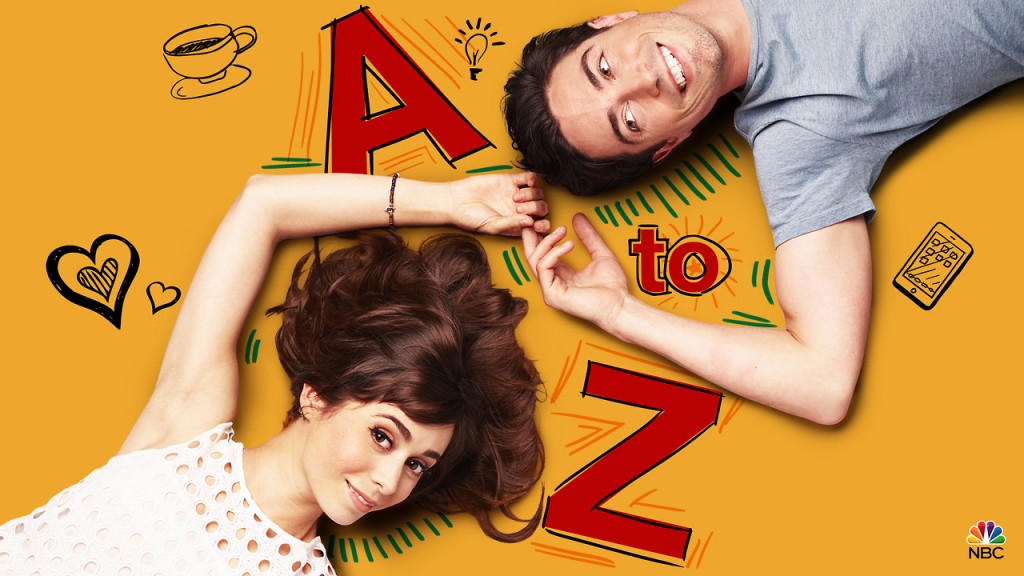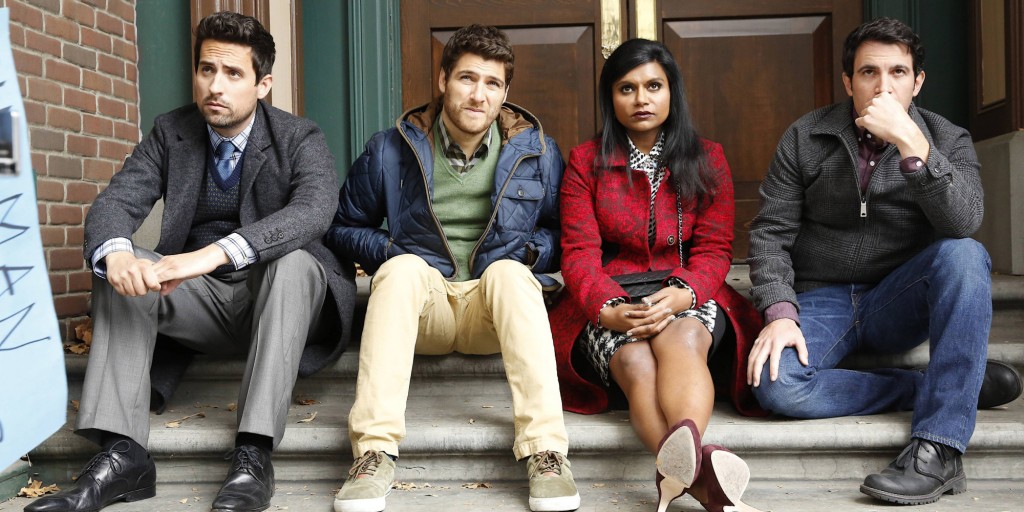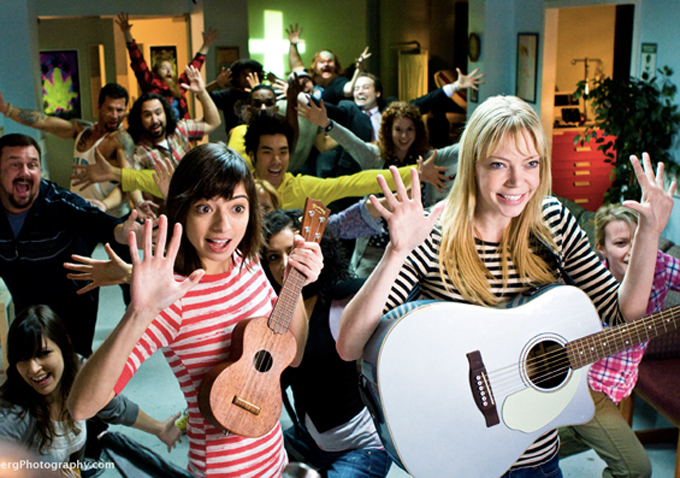The life of a television enthusiast isn’t all sunshine and couch-lounging. Every year around this time, we are forced to confront an awful truth: not all our shows will make it to a new season. In this postmortem, our staff reflects on the cancelled TV shows they watched this year, and why they’re sad to say goodbye.
A to Z, NBC
(One Season)
The 2014-15 season of television shall go down as the Year of the Rom-Com Sitcom. It technically started last summer with the sleeper success of FX’s You’re the Worst, a show that managed to bring out the best of a budding relationship between two generally awful people. With this as a forerunner, it seemed as though the networks finally got in on a trend while the getting was good, and had multiple shows primed for breakthrough. ABC’s Selfie and Manhattan Love Story both bombed almost immediately, while NBC threw their hats into the ring in the form of Marry Me, which sadly squandered its talent and pedigree as the follow up to Happy Endings for creator David Caspe and star Casey Wilson.
However, the best entry in the genre happened to be NBC’s other similarly short lived A to Z, which spells out its simple story from the very beginning. Our two leads “will date for 8 months, 3 weeks, 5 days, and 1 hour. This television program is the comprehensive account of their relationship,” Katey Sagal informs us as the omniscient narrator. What could’ve been a trite and borderline unwatchable cute-fest of a premise ends up being wildly more charming than it had any right to be, based almost solely on the likability of the cast. Andrew and Zelda*—played by Ben Feldman, best known as the scene-stealing Ginsberg on “Mad Men,” and Cristin Miloti, best known for bringing a shot of life to How I Met Your Mother on its last legs—are beyond delightful to watch.
These two manage to stand on their own as characters while possessing an adorably, magnetic chemistry. Add in Lenora Chrichlow and Henry Zebrowski, who both breathe inspired performances into what could have easily verged into the tired character trope of vague best friends. These four weren’t always given the best material, but it played to their strengths, and they made the sometimes over-written witty banter seem naturalistic and fun. Unfortunately, the show didn’t get enough time to find a good foothold and go on to create the best version of itself. With that said, it still remained a bright spot in a rather barren night of programming, and I always caught myself genuinely laughing at least a few times an episode. So, goodnight sweet prince A to Z, and may your dreams be of the ratings you never got. Amen.
*It took my roommate and I until a commercial break in the third episode—during the course of explaining the show to another person—that Andrew and Zelda was a play on “A to Z.” So take everything I’ve ever said with a grain of salt, I suppose.
-Tyler Austin
The Mindy Project, Fox
(Three Seasons)
Luckily, The Mindy Project has already been picked up for at least one more full season by Hulu as of press time, so we don’t have to say our final goodbyes just yet. Online video platforms seem to have a talent for necromancy and revamping dead shows.
One of my favorite things about The Mindy Project has always been Mindy’s character. Dr. Mindy Lahiri is over-confident, obnoxious, and self-centered. She’s not entirely likeable, much in the way that The Office’s Michael Scott is not, but there’s still something lovable about her. The surrounding cast of characters who make up the peculiar staff of the medical practice are another part of what made the show great, with outstanding performances by Adam Pally as bro doctor Peter Prentice, Ike Barinholtz as weirdo RN Morgan, and Xosha Roquemore as nurse Tamra. Chris Messina’s Danny Castellano constantly butting heads with Mindy makes for a great dynamic throughout the show, and it netted them People Magazine’s TV Couple of the Year award. The Mindy Project attempts to tackle issues like race, relationships, and feminism in an irreverent way.
The show has hosted a slew of awesome guest roles, including Laverne Cox and Shonda Rhimes as herself in the most recent season. Considering it shared a comedy block with Fox’s New Girl, and episodes delivered consistent laughs, there’s no reason it should have tanked. The third season pushed really hard with “big plot moments” when Mindy and Danny became pregnant midway through the season. Season Three is when most shows are still busy finding their footing, and Danny and Mindy’s relationship was also in that established-but-rocky state. Show writer and producer Mindy Kaling defended the choice in an InStyle magazine interview, reminding us that Mindy (the character) is already an established businesswoman in her thirties, unlike the twentysomethings of most TV sitcoms, and therefore a little further along in life.
I absolutely did not think this show deserved the axe. Critics didn’t, either, as every season of the show has continued to get favorable reviews, and it has received and won multiple award nominations. I think its downfall was that it had too much on its shoulders. Much of the criticism it was under was intense scrutiny for its portrayal of women and people of color, because it was a show written by and featuring an Indian-American woman. Originally, the show was lauded for its diverse casting, and then conversely criticized by its portrayal of those characters and Mindy’s (the character’s) tendency to only date white guys. The show attempted to directly address those concerns, but it ultimately had a lot to navigate for only a half-hour comedy show.
-Madie Coe
About a Boy, NBC
(Two Seasons)
I’m certainly not surprised that About a Boy got nixed—after all, I don’t think I could name a single person other than myself who watched it. But that doesn’t stop me from being sad. I waxed poetic on About a Boy back during its first season, and my feelings remained the same into its second, and now final, year.
About a Boy is a re-adaptation of the Nick Hornby novel, not a reboot or a sequel to the popular movie starring Hugh Grant and Warboy Nux. But this feel-good sitcom needed its predecessors to take the burden of the darker elements of Hornby’s story, so that we could simply enjoy the good vibrations of great family television. About a Boy version 3.0 is the story of thirtysomething bachelor Will (Mom-approved hottie David Walton), whose comfortable debaucherous life is upended by the arrival of his new neighbors: single mother Fiona (Minnie Driver) and her weird-ass pre-teen Marcus (Benjamin Stockham). What starts off as an unwilling babysitting gig for Will turns, unsurprisingly, into a sweet and fully reciprocal friendship between him and Marcus and, eventually, Fiona as well. There’s nothing new or revelatory here, but under the steady hand of Jason Katims, wunderkind mastermind of character-driven shows like Parenthood and Friday Night Lights, About a Boy was a touching and fully realized portrait of a wacky, non-traditional family.
I think what I’ll miss the most about this show is the perfect comic vehicle it created for Minnie Driver. I mean, she can do anything, but the character of Fiona is so out-of-this-world outlandish and genuinely funny that it hurts me to see her go. David Walton (call me) will hopefully not be long out of work with his devilishly fratty looks and surprising pathos, and of course, this is just the beginning for Benjamin Stockham, whose uniquely weird Marcus is the glue that holds this lovely show together. Now that it’s over and the second season will surely arrive on Netflix soon enough, let’s all do ourselves a favor and rewatch the sweet and short-lived About a Boy with our favorite siblings and a pound of barbecue.
-Haley Winters
Garfunkel & Oates, IFC
(One Season)
Garfunkel & Oates is a one-camera sitcom in which a quirky real-life comedy folk duo portrays a fictionalized version of themselves in a cartoonish caricature of their struggle to make it as performers, punctuated by spontaneous musical numbers from their catalog of songs. Yes, this is also an exact description of HBO’s Flight of the Conchords, and that may be the reason Garfunkel & Oates didn’t take off. Despite the second (and final) season of that show garnering a collective shrug from fans and critics, the first twelve-episode Conchords run has been elevated into the TV comedy canon, meaning any show with a similar premise is likely to attract comparisons.
It speaks to G&O’s struggle that the easiest way to describe it is to explain what makes it different from Flight of the Conchords: instead of starring two shy, awkward, mumbling New Zealanders who excel at cringe-inducing silences and deliberately fumbled jokes, Garfunkel & Oates is led by the charismatic and cocky-funny Riki “Garfunkel” Lindhorne and the brilliant but immature Kate “Oates” Micucci, and their snappy rapport is where a lot of the humor comes from. Garfunkel & Oates really has more in common with Portlandia in terms of its sense of humor and joke rhythm; they’re both quick, clever, silly, and challenging.
Lindhorne and Micucci (the former of whom wrote the bulk of the series) delight in taking on gender double-standards and sexual hangups. In one episode, “Speechless,” Riki and Kate try to see who can go longer without speaking at their double date, to test whether or not men really prefer a woman who has nothing to say. (Neither of their dates notice that they’re silent, of course, for a really, really long time. Like weeks.) There’s a song in the first episode that details Riki’s thoughts while performing oral sex, and it ends with her throwing up. This is a unique television show.
So why didn’t Garfunkel & Oates catch on? It probably wasn’t any one thing, but if I had to pick out the show’s greatest weakness it would have to be the songs. Unlike Flight of the Conchords’ catchy, sing-along-able comedy folk, G&O’s songs are wordy, dense, and often delivered very quickly. They also rely heavily on shock value, which is naturally going to offer diminishing returns over time. They’re just not memorable in the way FotC’s “Bowies in Space” or “Business Time” are. As characters, Riki and Kate are far and away more entertaining than Bret and Jemaine from FotC, but as a band, Garfunkel & Oates doesn’t cut the mustard, and as a result, we’re denied their further misadventures.
-Dylan Roth
What canceled show are you mourning this season? Post a comment below or hit us up on Facebook or Twitter!





